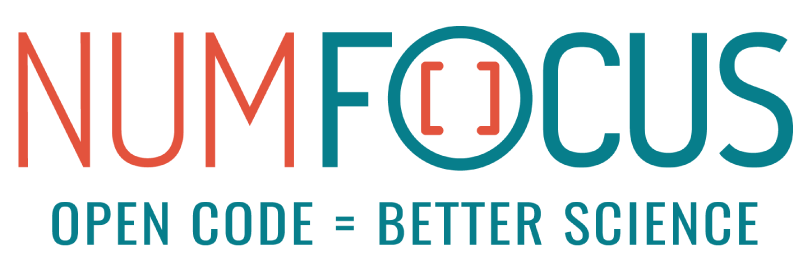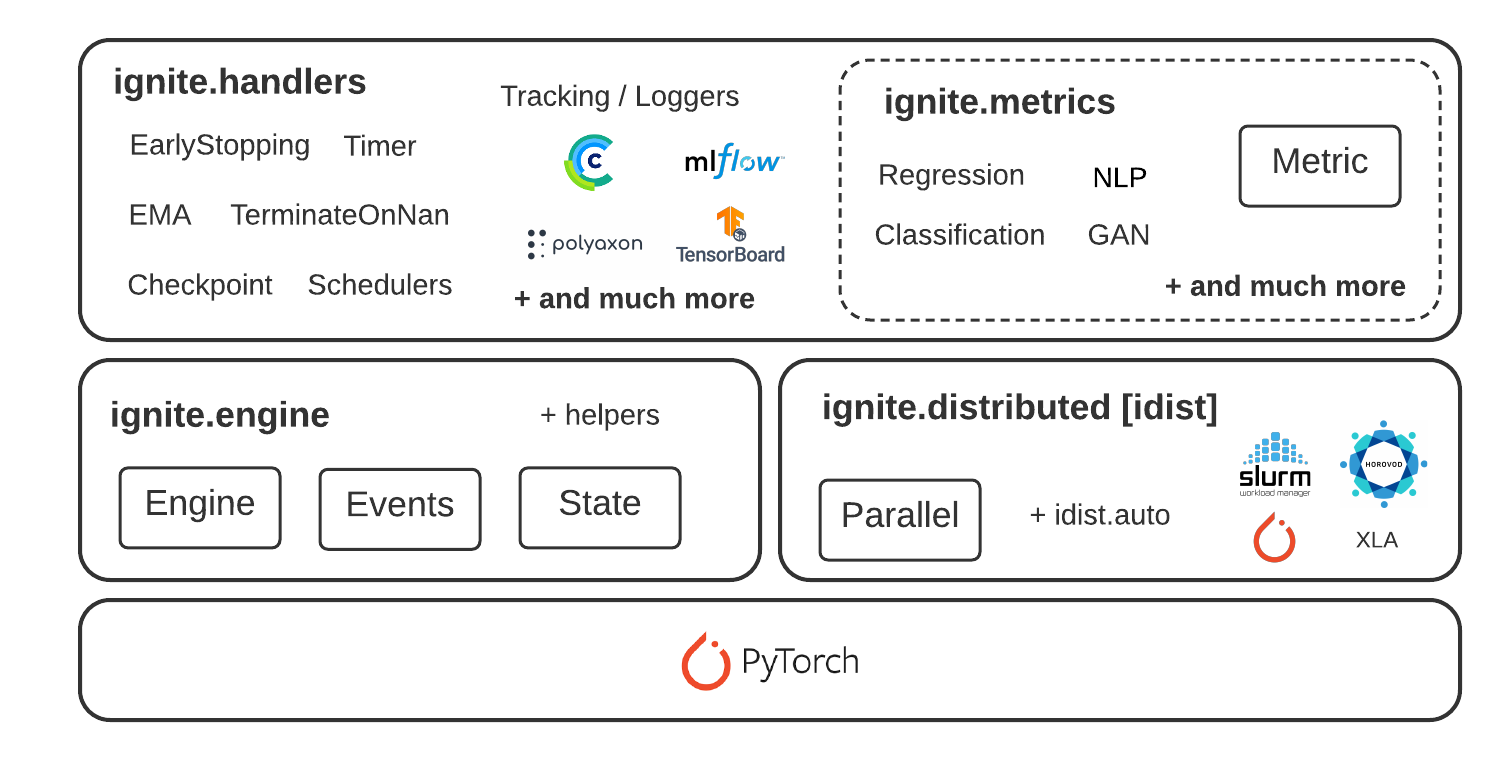PyData Riyadh Sprint
PyTorch-Ignite
High-level library to help with training and evaluating neural networks in PyTorch flexibly and transparently.
if __name__ == "__main__":
print("Let's have fun helping PyTorch-Ignite open source project !")
Slides: https://pytorch-ignite.github.io/pydata-riyadh-2022-slides/
Maintainers leading the sprint
| Priyansi @Priyansi | A CS Undergrad. Currently working on the docs of PyTorch-Ignite and helping manage the community | |
| Victor @vfdev-5 | Software Engineer at Quansight working on AI-related open source projects | |
| François @fco-dv | Software Engineer at IFPEN |
Content
- About the PyTorch-Ignite project
- What are PyTorch and PyTorch-Ignite ?
- Quick-start PyTorch-Ignite example
- How you can help ?
About “PyTorch-Ignite” project
Community-driven open source and NumFOCUS Affiliated Project
maintained by volunteers in the PyTorch community:
@vfdev-5, @ydcjeff, @KickItLikeShika, @sdesrozis, @alykhantejani, @anmolsjoshi,
@trsvchn, @fco-dv, @Priyansi, @Moh-Yakoub, @gucifer, @Ishan-Kumar2 ...



With the support of:





Community Engagement
Google Summer of Code 2021
- Mentored two great students (Ahmed and Arpan)
Google Season of Docs 2021
- Worked with great tech writer (Priyansi)
Hacktoberfest 2020 and 2021
PyData Global Mentored Sprint 2020 and 2021
Public meetings on Discord, open to everyone
Stay tuned for upcoming events …



PyTorch in a nutshell
| .
|
Quick-start ML with PyTorch
Computer Vision example with Fashion MNIST
Problem: 1 - how to classify images ?
model(image) -> predicted label
2 - How measure model performances ?
predicted labels vs correct labels

Quick-start ML with PyTorch
- Setup training and testing data
from torch.utils.data import DataLoader
from torchvision import datasets
from torchvision.transforms import ToTensor, Lambda, Compose
# Setup training/test data
training_data = datasets.FashionMNIST(root="data", train=True, download=True, transform=ToTensor())
test_data = datasets.FashionMNIST(root="data", train=False, transform=ToTensor())
batch_size = 64
# Create data loaders
train_dataloader = DataLoader(training_data, batch_size=batch_size)
test_dataloader = DataLoader(test_data, batch_size=batch_size)
# Optionally, for debugging:
for X, y in test_dataloader:
print("Shape of X [N, C, H, W]: ", X.shape)
print("Shape of y: ", y.shape, y.dtype)
break
# Output:
# Shape of X [N, C, H, W]: torch.Size([64, 1, 28, 28])
# Shape of y: torch.Size([64]) torch.int64
Quick-start ML with PyTorch
- Create a model
import torch
from torch import nn
device = "cuda" if torch.cuda.is_available() else "cpu"
class NeuralNetwork(nn.Module):
def __init__(self):
super(NeuralNetwork, self).__init__()
self.flatten = nn.Flatten()
self.linear_relu_stack = nn.Sequential(
nn.Linear(28*28, 512),
nn.ReLU(),
nn.Linear(512, 512),
nn.ReLU(),
nn.Linear(512, 10)
)
def forward(self, x):
x = self.flatten(x)
logits = self.linear_relu_stack(x)
return logits
model = NeuralNetwork().to(device)
Quick-start ML with PyTorch
- Model training
- Loss function: cross-entropy
- Optimization with Stochastic Gradient Descent
loss_fn = nn.CrossEntropyLoss()
optimizer = torch.optim.SGD(model.parameters(), lr=1e-3)
def train(dataloader, model, loss_fn, optimizer):
model.train()
for X, y in dataloader:
X, y = X.to(device), y.to(device)
pred = model(X)
loss = loss_fn(pred, y)
# Backpropagation
optimizer.zero_grad()
loss.backward()
optimizer.step()
def test(dataloader, model, loss_fn):
# code to compute and print average loss and accuracy
epochs = 5
for t in range(epochs):
print(f"Epoch {t+1}\n-------------------------------")
train(train_dataloader, model, loss_fn, optimizer)
test(test_dataloader, model, loss_fn)
print("Done!")
Why using PyTorch without Ignite is suboptimal ?
For NN training and evaluation:
- PyTorch gives only “low”-level building components
- Common bricks to code in any user project:
- metrics
- checkpointing, best model saving, early stopping, …
- logging to experiment tracking systems
- code adaptation for device (e.g. GPU, XLA)
- Pure PyTorch code
model = Net()
train_loader, val_loader = get_data_loaders(train_batch_size, val_batch_size)
optimizer = torch.optim.SGD(model.parameters(), lr=0.01, momentum=0.8)
criterion = torch.nn.NLLLoss()
max_epochs = 10
validate_every = 100
checkpoint_every = 100
def validate(model, val_loader):
model = model.eval()
num_correct = 0
num_examples = 0
for batch in val_loader:
input, target = batch
output = model(input)
correct = torch.eq(torch.round(output).type(target.type()), target).view(-1)
num_correct += torch.sum(correct).item()
num_examples += correct.shape[0]
return num_correct / num_examples
def checkpoint(model, optimizer, checkpoint_dir):
# ...
def save_best_model(model, current_accuracy, best_accuracy):
# ...
iteration = 0
best_accuracy = 0.0
for epoch in range(max_epochs):
for batch in train_loader:
model = model.train()
optimizer.zero_grad()
input, target = batch
output = model(input)
loss = criterion(output, target)
loss.backward()
optimizer.step()
if iteration % validate_every == 0:
binary_accuracy = validate(model, val_loader)
print("After {} iterations, binary accuracy = {:.2f}"
.format(iteration, binary_accuracy))
save_best_model(model, binary_accuracy, best_accuracy)
if iteration % checkpoint_every == 0:
checkpoint(model, optimizer, checkpoint_dir)
iteration += 1
PyTorch-Ignite: what and why? 🤔
High-level library to help with training and evaluating neural networks in PyTorch flexibly and transparently.
| | |
Key concepts in a nutshell
PyTorch-Ignite is about:
- Engine and Event System
- Out-of-the-box metrics to easily evaluate models
- Built-in handlers to compose training pipeline
- Distributed Training support
What makes PyTorch-Ignite unique ?
- Composable and interoperable components
- Simple and understandable code
- Open-source community involvement
How PyTorch-Ignite makes user’s live easier ?
With PyTorch-Ignite:
- Less code than pure PyTorch while ensuring maximum control and simplicity
- Easily get more refactored and structured code
- Extensible API for metrics, experiment managers, and other components
- Same code for non-distributed and distributed configs
Quick-start PyTorch-Ignite example 👩💻👨💻
Let’s train a MNIST classifier with PyTorch-Ignite!
https://pytorch-ignite.ai/tutorials/beginner/01-getting-started/
Any questions before we go on ?
How you can help ?
Participating GitHub repositories:
➡️ PyTorch-Ignite - Library to help with training and evaluating neural networks
PyTorch-Ignite Examples repository - Examples, tutorials, and how-to guides
Prerequisites
- Basic Python knowledge
- Basic PyTorch knowledge
- Basic Machine Learning knowledge
Start contributing
Codebase structure
- ignite - Core library files
- engine - Module containing core classes like Engine, Events, State.
- handlers - Module containing out-of-the-box handlers
- metrics - Module containing out-of-the-box metrics
- contrib - Contrib module with other metrics, handlers classes that may require additional dependencies
- distributed - Module with helpers for distributed computations
- tests - Python unit tests
- docs - Documentation files
https://github.com/pytorch/ignite/blob/master/CONTRIBUTING.md#developing-ignite
Help-wanted issues:
https://github.com/pytorch/ignite/issues?q=is%3Aissue+is%3Aopen+label%3A%22help+wanted%22
How you can help ?
Participating GitHub repositories:
PyTorch-Ignite - Library to help with training and evaluating neural networks
➡️ PyTorch-Ignite Examples repository - Examples, tutorials, and how-to guides
Prerequisites
- Basic Machine/Deep Learning knowledge
- Basic PyTorch and PyTorch-Ignite knowledge
Start contributing (1/2)
Your feedback is valuable!
- Check out our new site: https://pytorch-ignite.ai/
- Open an issue if see a typo, something is not clear, etc
Start contributing (2/2)
Contributing guidelines:
- Setup Jupyter Lab/Notebook with PyTorch and PyTorch-Ignite installed
- https://pytorch.org/get-started/locally/
pip install pytorch-ignite
Help-wanted issues:
Thank you for participatingin this sprint session ! | Follow us on and check out our new website: |
We are looking for contributors to help out with the project.
 Everyone is welcome to contribute
Everyone is welcome to contribute

The Big Picture

Engine and Event System
.
| In its simpliest form: |
Simplified training and validation loop
No more coding for/while loops on epochs and iterations. Users instantiate engines and run them.
from ignite.engine import Engine, Events, create_supervised_evaluator
from ignite.metrics import Accuracy
# Setup training engine:
def train_step(engine, batch):
# Users can do whatever they need on a single iteration
# Eg. forward/backward pass for any number of models, optimizers, etc.
# ...
trainer = Engine(train_step)
# Setup single model evaluation engine
evaluator = create_supervised_evaluator(model, metrics={"accuracy": Accuracy()})
def validation():
state = evaluator.run(validation_data_loader)
# print computed metrics
print(trainer.state.epoch, state.metrics)
# Run model's validation at the end of each epoch
trainer.add_event_handler(Events.EPOCH_COMPLETED, validation)
# Start the training
trainer.run(training_data_loader, max_epochs=100)
Power of Events & Handlers 🚀
1. Execute any number of functions whenever you wish
Handlers can be any function: e.g. lambda, simple function, class method, etc.
trainer.add_event_handler(Events.STARTED, lambda _: print("Start training"))
# attach handler with args, kwargs
mydata = [1, 2, 3, 4]
logger = ...
def on_training_ended(data):
print(f"Training is ended. mydata={data}")
# User can use variables from another scope
logger.info("Training is ended")
trainer.add_event_handler(Events.COMPLETED, on_training_ended, mydata)
# call any number of functions on a single event
trainer.add_event_handler(Events.COMPLETED, lambda engine: print(engine.state.times))
@trainer.on(Events.ITERATION_COMPLETED)
def log_something(engine):
print(engine.state.output)
Power of Events & Handlers
2. Built-in events filtering and stacking
# run the validation every 5 epochs
@trainer.on(Events.EPOCH_COMPLETED(every=5))
def run_validation():
# run validation
@trainer.on(Events.COMPLETED | Events.EPOCH_COMPLETED(every=10))
def run_another_validation():
# ...
# change some training variable once on 20th epoch
@trainer.on(Events.EPOCH_STARTED(once=20))
def change_training_variable():
# ...
# Trigger handler with customly defined frequency
@trainer.on(Events.ITERATION_COMPLETED(event_filter=first_x_iters))
def log_gradients():
# ...
Power of Events & Handlers
3. Custom events to go beyond standard events
from ignite.engine import EventEnum
# Define custom events
class BackpropEvents(EventEnum):
BACKWARD_STARTED = 'backward_started'
BACKWARD_COMPLETED = 'backward_completed'
OPTIM_STEP_COMPLETED = 'optim_step_completed'
def train_step(engine, batch):
# ...
loss = criterion(y_pred, y)
engine.fire_event(BackpropEvents.BACKWARD_STARTED)
loss.backward()
engine.fire_event(BackpropEvents.BACKWARD_COMPLETED)
optimizer.step()
engine.fire_event(BackpropEvents.OPTIM_STEP_COMPLETED)
# ...
trainer = Engine(train_step)
trainer.register_events(*BackpropEvents)
@trainer.on(BackpropEvents.BACKWARD_STARTED)
def function_before_backprop(engine):
# ...
Out-of-the-box metrics 📈
50+ distributed ready out-of-the-box metrics to easily evaluate models.
- Dedicated to many Deep Learning tasks
- Easily composable to assemble a custom metric
- Easily extendable to create custom metrics
precision = Precision(average=False)
recall = Recall(average=False)
F1_per_class = (precision * recall * 2 / (precision + recall))
F1_mean = F1_per_class.mean() # torch mean method
F1_mean.attach(engine, "F1")
Built-in Handlers
.
| |
Distributed Training support
Run the same code across all supported backends seamlessly
- Backends from native torch distributed configuration:
nccl,gloo,mpi - Horovod framework with
glooorncclcommunication backend - XLA on TPUs via
pytorch/xla
import ignite.distributed as idist
def training(local_rank, *args, **kwargs):
dataloder_train = idist.auto_dataloder(dataset, ...)
model = ...
model = idist.auto_model(model)
optimizer = ...
optimizer = idist.auto_optimizer(optimizer)
backend = 'nccl' # or 'gloo', 'horovod', 'xla-tpu' or None
with idist.Parallel(backend) as parallel:
parallel.run(training)
Distributed Training support
Distributed launchers
Handle distributed launchers with the same code
torch.multiprocessing.spawntorch.distributed.launchhorovodrunslurm
Distributed Training support
Unified Distributed API
High-level helper methods
idist.auto_model()idist.auto_optim()idist.auto_dataloader()
Collective operations
all_reduce,all_gather, and more
Any questions before we go on ?